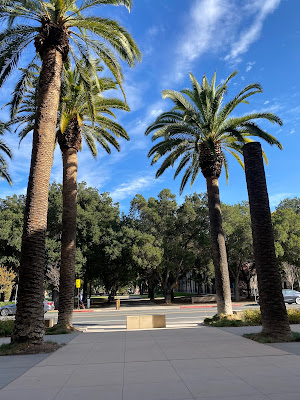Palm trees on campus*. Photo by Lucy Bernholz
I've always doubted the effective altruism (EA) approach. Making as much money as you can so you can give it away is 1) an individual approach to societal problems, 2) a fancy way of alleviating rich people's guilty consciences, and 3) the focus on self-made metrics contributes to the distancing of donors from communities. In my snarky moments I've been known to point out that the most ardent adherents of EA seemed to be quant jocks and philosophers - two groups that tend to complicate things rather than simplify them. The self-referential and self-aggrandizing nature of many EA adherents is a big put-off. Longtermism seems to me to result in a lot of vanity projects. I could go on and on. And in fact, I do, go on and on a bit in the forthcoming Blueprint 2023.
All that being said, some of the EA's most influential thinkers did the right thing by immediately resigning from the FTX Future Fund (Sam Bankman-Fried's EA-committed philanthropic fund) immediately upon hearing of the financial shenanigans and bankruptcy of FTX and for calling out their concerns about fraud. In their words:
"We are now unable to perform our work or process grants, and we have fundamental questions about the legitimacy and integrity of the business operations that were funding the FTX Foundation and the Future Fund. As a result, we resigned earlier today.
We don’t yet have a full picture of what went wrong, and we are following the news online as it unfolds. But to the extent that the leadership of FTX may have engaged in deception or dishonesty, we condemn that behavior in the strongest possible terms. We believe that being a good actor in the world means striving to act with honesty and integrity."
So, fraudulent behavior in the name of good acts is not OK. That oughta be obvious and the individuals involved above commended on their actions.
But fraud in the name of good is not only an individual problem. We've built a larger system of giving and philanthropic adoration that repeatedly and reliably sets up philanthropic acts as a cover up for bad corporate and billionaire behavior. Bad behavior is not the same as fraud, but the former might be a gateway drug to the latter.
- Time after time we get stories such as Bezos gives $100 million to Dolly Parton and promises to give away his fortune sitting one column away from stories about layoffs, union busting, safety concerns, surveillance-expanding devices, etc. at Amazon.
- The Sackler family philanthropy and oxycontin profits.
The two stories above are probably better thought of as "philanthropy-washing" then fraud. If the concerns about FTX turn out to be true, then it will go down as a massive scam which conned itself out of public, regulatory, and investor oversight, at least partly through its philanthropic claims.
As a long time critic of "[Blank] for good" initiatives from tech companies and others, the idea of committing fraud for good is more than just a bit of schadenfreude. It's a warning to all of us. The entanglement of profit-making and good-doing is problematic in so many ways that labeling it all "fraud for good" is just too tempting.
What will come of all this? Charitable donations may be clawed back to repay investors. That alone says much about the priorities of this dynamic and the way things are regulated.
I suspect we'll see more organizations establishing donation policies regarding crypto-wealth generated donations. The rise of research into tech's social harms has already led many such groups to declare tech wealth off limits; just as the ACLU has long shunned government funding and Consumer Reports doesn't take corporate money from product companies. Tobacco and fossil fuel company donations led the way in being seen as "toxic;" we're likely to see ever more domains of industry put into those categories.
Bibliography - other links on FTX and philanthropy
Chronicle of Philanthropy (may be paywalled)
Critiques of effective altruism (publishing sites listed below; opinions are those of the authors)
*I took this picture on the Stanford campus in November, 2022. I've often joked to people that "even the palm trees on campus have donor plaques on them." This is not true, but if it were, I'd guess the tree on the right front side of the picture (the one without a top) is the "FTX palm."

No comments:
Post a Comment